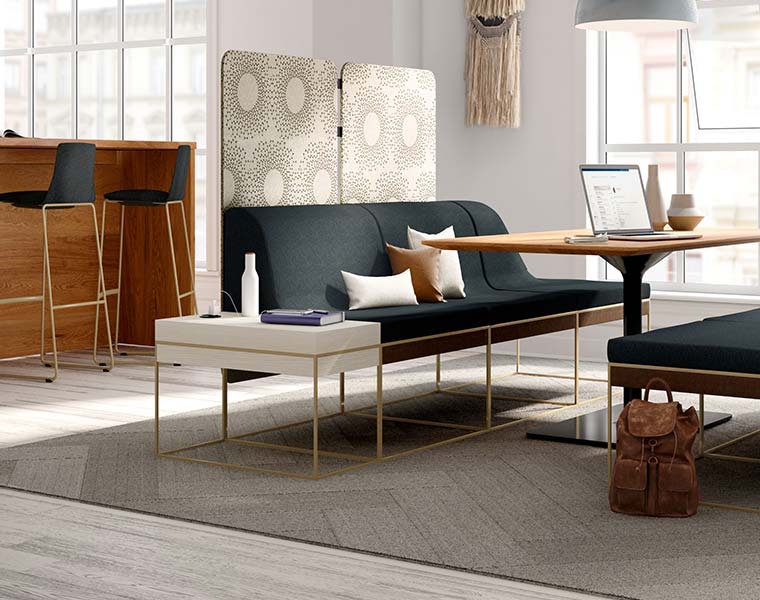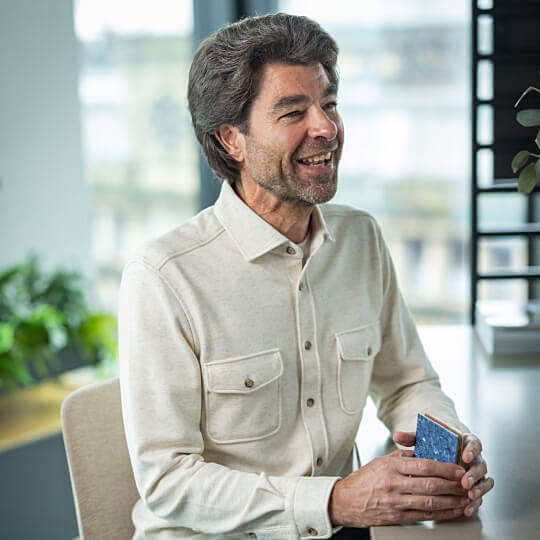When a customer asks us about what makes us the perfect office design partner, our strong relationship with Steelcase is something we always like to touch upon.
As the North West’s authorised Steelcase dealer, we have unlimited access to their round-the-clock industry research, expert insights and latest product developments.
Not only does this mean we can kit clients out with some state-of-the-art Steelcase furniture and technology as part of their overall design scheme, it also enables us to deliver a constant supply of knowledge and inspiration.
Steelcase’s concept of the 6 dimensions of workplace wellbeing is something we always keep in mind when creating spaces and thought-led work settings.
With this in mind, we wanted to delve deeper into what each of the six pillars stand for and how you can facilitate them through strategic commercial interior design.
OPTIMISM
Defined by: creativity and innovative thought-leadership
This dimension is all about encouraging people to be open to change and new ways of working in order to foster ongoing innovation and stay ahead of the curve.
Optimism is about exploring ideas with an open mind to future-proof the workplace and better the company by making it more agile and versatile.
Office interior design tips:
- Provide an ecosystem of diverse work settings which allow staff choice and control around where, when and how they carry out tasks.
- Modern technology and furniture which breaks down traditional processes to offer more productive and collaborative idea-sharing solutions.
- More transparency in terms of workplace culture and physical office design e.g. glass partition walls, which are one of our identified 2019 interior design trends.
MINDFULNESS
Defined by: fully immersed engagement
Mindfulness in the workplace is about being present and participating despite the super-speed at which the modern (working and personal) world turns.
Multitasking is the enemy of mindfulness. Just think about if you’ve ever been sat in an important meeting with one eye on what’s going on and the other on your smartwatch as you watch a never-ending stream of emails pour in.
As a result, workspaces of today need settings where staff can go to process and better manage regular cognitive overload.
We recommend:
- Spaces which require little or no technology for use.
- Consideration about the psychological impact of design elements such as fabrics, textures, colours and lighting.
- Quiet, private spaces dedicated to rejuvenation, yoga, meditation etc – a trend we are also noticing as part of a move towards more inclusive interior design.
- Acoustic solutions and space division to limit visual and audible distraction.
AUTHENTICITY
Defined by: feeling safe enough to be your true self
This dimension covers the freedom for staff to be who they are and feel comfortable and safe in doing so.
Facilitating this authentic state of being in the workplace will then fend off counterproductive feelings of frustration and resentment.
Beatriz Arantes, psychologist involved in the Steelcase Workspace Futures global research shares our own belief that:
“Workers need spaces where they can feel a part of the organisation’s culture, while feeling encouraged to express their own ideas and values.”
Office design advice:
- Incorporate dedicated social spaces where staff can relax in comfort and be themselves.
- Include resimercial design elements to make the space feel more homely and ‘normal’.
- Communicate brand messages clearly so staff can align their personal values with business values.
BELONGING
Defined by: having connections to other people
Belonging, as the name suggests, is all about feeling like a part of the business. It also encompasses connections with other people and feeling useful and valuable in your role.
As Steelcase researchers rightly highlight, “relationships anchor people’s commitment to an organisation” so it’s essential that interaction and communication are facilitated.
Improving connection and communication in the workplace:
- Workspace personalisation which enables people to feel a sense of professional identity – something which has become increasingly different with the rise of agile, nomadic working.
- Video conferencing connects staff across geographical locations and also helps to improve communication between resident and remote workers.
MEANING
Defined by: a strong sense of purpose
Meaning comes about when staff are passionate and committed to what they do. It is also fostered when workers feel a strong connection to brand values and messages, especially when they align with their personal objectives.
Creating meaning is about sharing a vision, which is nicely summarised in this comment from Arantes:
“Brand isn’t just for the client. Brand is also for the people inside the company to have a meaningful understanding of what the brand stands for and to be mindful of it in their everyday work.”
Commercial design tips:
- Choice and control for staff who want to choose their work setting in line with specific task and requirement.
- Clear communication of brand messages through both design and company culture.
- Collaboration spaces where staff can come together to share ideas and a vision.
Click for more on how office design can communicate your brand.
VITALITY
Defined by: motivation; get up and go
This dimension involves the mind and body functioning together as one interrelated system to nurture a happy, healthy and motivated member of staff.
Scientific studies have proven the correlation between low muscle activity and flow of nutrients in the brain.
So, if staff are sedentary and physically unfit, it will likely have a negative impact on their cognitive function and overall professional performance.
Popular office design solutions:
- Ergonomic furniture which supports a variety of postures such as height-adjustable desks
- Freedom of movement around the workplace
- Standing or walking meetings to increase physical movement
- Touchdown furniture solutions to support agility

